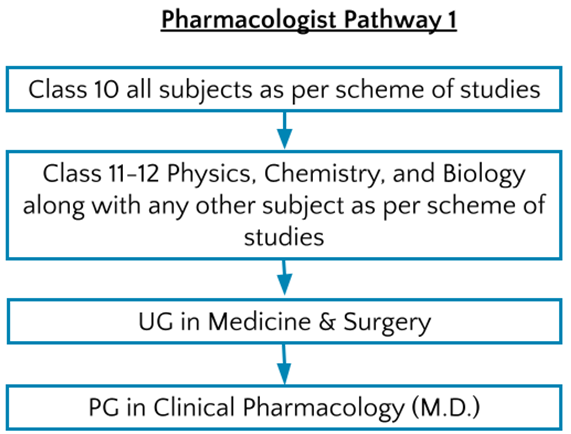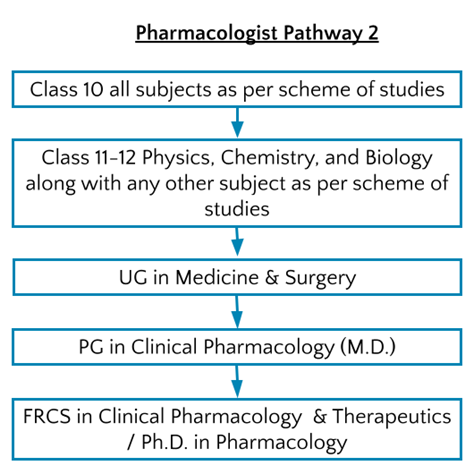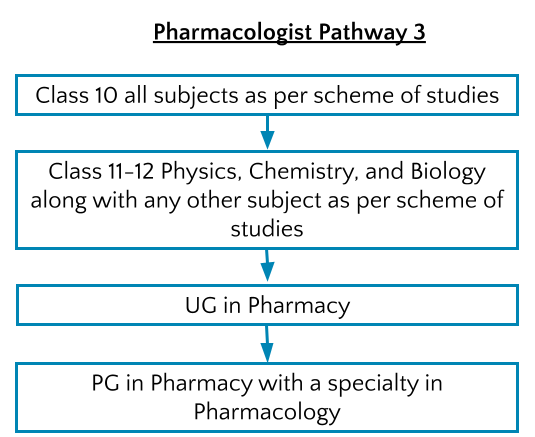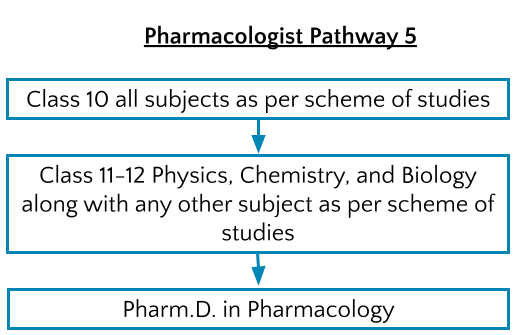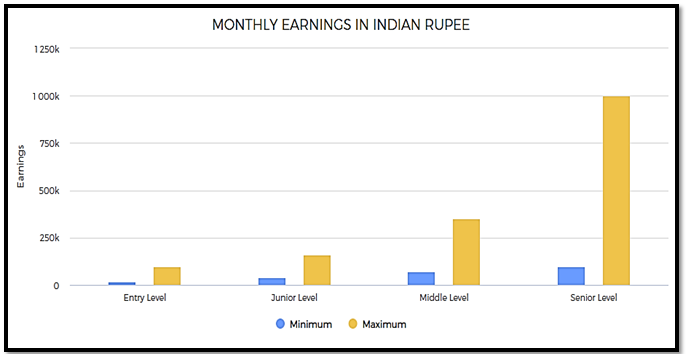Pharmacologist
Entry Level Qualification
12
Career Fields
Medical Services
For Specially Abled






About Career
1. The Pharmacologist is a drugs specialist. As a Pharmacologist, you will be involved in study and research about how various drugs or drug molecules affect human cells, tissues, organs, physiological systems, and biochemical processes in the human body. In simple terms, you will study and research to develop knowledge and insights on how drugs work upon the human body to prevent and cure diseases, ailments, and injuries.
2. You will study and research about drug molecules and analyse how drug molecules react with the biochemical processes in human cells, tissues, and organs. You will study how drugs can change the various processes inside a human cell so as to influence the cell to act in a particular way. For example, how a drug molecule can change the kind of hormones a cell secretes. You will study the toxicological effects of a drug molecule on the human body. As a Pharmacologist, you will study what happens when a drug molecule is absorbed in the bloodstream of a human body. You will study what biochemical changes happen to the molecule and how do those happen.
Key Roles And Responsibilities
As a Pharmacologist, there will be different roles and responsibilities under different specializations. Few of them are discussed below:
1. Provide scientific expertise in the area of pharmaceutics, and pharmacokinetics, and clinical pharmacology.
2. Apply in-depth knowledge of chemistry, biology, pharmacokinetics, physiology, clinical pharmacology/pharmacy and medical science in the review of Investigational New Drugs (IND), New Drug Applications (NDAs), and Form 5 applications.
3. Arrange for and act as a Project Officer on extramural contracts to resolve problems encountered in the review procedures.
4. Remain cognizant of developments in the field, and exchange ideas with other scientists.
5. Maintain awareness of the state of the art through a continuing review of the scientific literature and studies of precedent-setting investigations to develop specific approaches to assigned areas of responsibility
PARTICULARS | DESCRIPTION |
Name | Pharmacologist |
Purpose | Conducting Research and Data Analysis |
Career Field | Allied & Para Medical Science |
Required Entrance Exam | No Entrance Exam |
Average Salary | 10,00,000 - 12,00,000 Rs. Per Year |
Companies For You | Dr. Reddy, Cipla, Fortis & Many More |
Who is Eligible | Graduate |
Career Entry Pathway
Class 10 all subjects as per scheme of studies – Class 11-12 Physics, Chemistry, and Biology along with any other subject as per scheme of studies – UG in Medicine & Surgery – PG in Clinical Pharmacology (M.D.)
After your Class 10 all subjects as per scheme of studies pursue Class 11-12 Physics, Chemistry, and Biology along with any other subject as per scheme of studies and then study for an undergraduate degree in Medicine & Surgery followed by a specialty degree in Clinical Pharmacology (M.D.).
Class 10 all subjects as per scheme of studies – Class 11-12 Physics, Chemistry, and Biology along with any other subject as per scheme of studies – UG in Medicine & Surgery – PG in Clinical Pharmacology (M.D.) – FRCS in Clinical Pharmacology & Therapeutics / Ph.D. in Pharmacology
After your Class 10 all subjects as per scheme of studies pursue Class 11-12 Physics, Chemistry, and Biology along with any other subject as per scheme of studies and then study for an undergraduate degree in Medicine & Surgery followed by a specialty in Clinical Pharmacology (M.D.). After your M.D., you may attempt to obtain an FRCS from the UK or similar fellowship from the US. Alternatively, you may also do a Ph.D. in India.
Class 10 all subjects as per scheme of studies – Class 11-12 Physics, Chemistry, and Biology along with any other subject as per scheme of studies – UG in Pharmacy – PG in Pharmacy with a specialty in Pharmacology
After your Class 10 all subjects as per scheme of studies pursue Class 11-12 Physics, Chemistry, and Biology along with any other subject as per scheme of studies and then study for an undergraduate degree in Pharmacy followed by a master’s degree in Pharmacy with a specialty in Pharmacology.
Class 10 all subjects as per scheme of studies – Class 11-12 Physics, Chemistry, and Biology along with any other subject as per scheme of studies – UG in Pharmacy – PG in Pharmacy with a specialty in Pharmacology -Ph.D. in Pharmacology
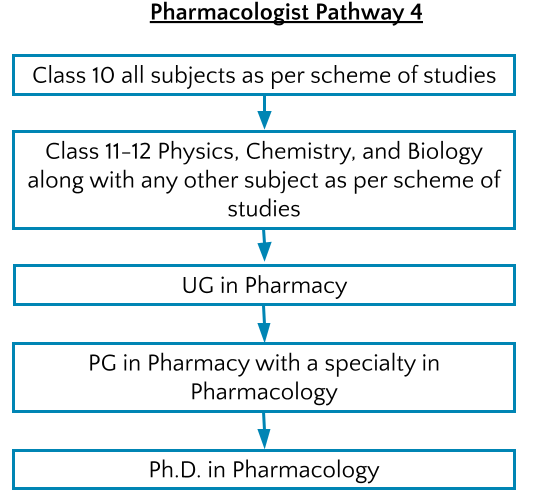
After your Class 10 all subjects as per scheme of studies pursue Class 11-12 Physics, Chemistry, and Biology along with any other subject as per scheme of studies and then study for an undergraduate degree in Pharmacy followed by a master’s degree in Pharmacy with a specialty in Pharmacology. You can then complete a Ph.D. in Pharmacology.
Class 10 all subjects as per scheme of studies – Class 11-12 Physics, Chemistry, and Biology along with any other subject as per scheme of studies – Pharm.D. in Pharmacology
After your Class 10 all subjects as per scheme of studies pursue Class 11-12 Physics, Chemistry, and Biology along with any other subject as per the scheme of studies and then study for a Doctoral degree in Pharmacy (Pharm.D.) with specialization in Pharmacology.
Required Qualification & Competencies
Undergraduate studies after school
To become a Pharmacologist, you should complete your schooling with Physics, Chemistry and Biology and join the following streams:
1. You can complete M.B.B.S. or Dentistry
2. You can also complete Bachelor of Pharmacy
Post Graduate and Doctoral studies
1. After finishing M.B.B.S., you can opt for M.D. in Clinical Pharmacology. You can also study Clinical Pharmacology or Pharmacology.
2. Alternatively, after M.B.B.S. and M.D., you may opt for an FRCS fellowship from the UK.
3. After Bachelor of Pharmacy, you can pursue a Master degree in Pharmacy with specialization in Pharmacology and then you can do a Ph.D.
MINIMUM EDUCATION REQUIRED | MAXIMUM EDUCATION REQUIRED |
Post Graduate Postgraduate Degree / Diploma / Certificate Programs for which the minimum eligibility is a pass in Graduation / equivalent Diploma program like Honours Diploma or Graduate Diploma. | Post-Doctoral Post Ph.D. programs for which the minimum eligibility is a Doctoral degree. |
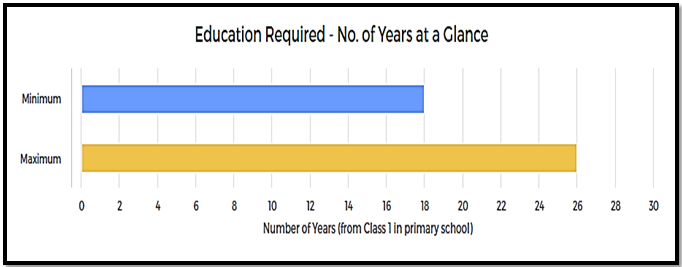
Competencies Required
You should have the following occupational interests:
1. Investigative: You should have an interest in Investigative Occupations. Investigative occupations involve working with ideas and quite a lot of thinking, often abstract or conceptual thinking. These involve learning about facts and figures; involve the use of data analysis, assessment of situations, decision making and problem-solving.
2. Conventional: You should have an interest in Conventional Occupations. Conventional occupations involve repetitive and routine tasks as well as fixed processes or procedures for getting things done. These occupations involve working more with data, systems, and procedures and less with ideas or creativity.
3. Social: You should have an interest in Social Occupations. Social occupations involve helping or assisting others; these involve working with and communicating with people to provide various services; these may involve educating and advising others.
The following personality attributes are required:
1. You are always or mostly organised in your day-to-day life and activities.
2. You are always or mostly disciplined in your action and behaviour.
3. You are always practical or in most situations.
4. You are always or mostly care about your actions and behaviour.
5. You are always or mostly a soft-hearted person.
6. You are always or mostly helpful to others.
7. You are always or mostly caring, supportive, sympathetic and kind to others.
You should have the following skills and knowledge:
1. Reading Comprehension: Skills in understanding written sentences and paragraphs in work related documents.
2. Critical Thinking: Skills in the analysis of complex situations, using logic and reasoning to understand the situations and take appropriate actions or make interpretations and inferences.
3. Active Listening: Giving full attention to what other people are saying, understanding the points being made by others, asking questions, etc.
4. Medicine: Knowledge of the science of diagnosis, treatment, and prevention of human diseases, ailment, injuries, and disorders. This includes understanding the symptoms, knowledge of the diagnostic processes, knowledge of the treatment procedures and medicines, and preventive healthcare measures.
5. Biological Science: Knowledge of plants and animals, their anatomical structure, cell structure, tissues, physiological functions, evolution, and all other related aspects.
6. Chemical Science: Knowledge of the chemical composition, structure, and properties of substances and of the chemical processes and transformations that they undergo. This includes uses of chemicals and their interactions, toxicity, production techniques, and disposal methods.
You should have the following aptitudes and abilities:
1. Problem Sensitivity: The ability to tell when something is wrong or is likely to go wrong. It does not involve solving the problem, only recognizing there is a problem.
2. Oral Comprehension: The ability to listen to and understand information and ideas presented through spoken words and sentences.
3. Oral Expression: The ability to communicate information and ideas in speaking so others will understand.
4. Near Vision: The ability to see details at close range (within a few feet of the observer).
5. Written Comprehension: The ability to read and understand information and ideas presented in writing.
Career - Job Opportunities & Profiles
1. After M.B.B.S., you can join the medical college as a junior resident doctor and continue your M.D. studies.
2. After your M.D. Course, you can obtain an FRCS fellowship from the UK.
3. You can join hospitals, clinics, railway hospitals, emergency medical centres, cancer hospitals as Medical Officers.
4. You can also join the medical college at the rank of Assistant Professor.
5. You can join Drug manufacturing companies in R&D and marketing auditing department as Pharma Trainee.
6. If you are into the regulatory side, you can join food and drug administration or drug manufacturing companies as Regulatory Officer.
7. You can join healthcare companies as Medical Advisor.
You can find job opportunities at the following facilities:
1. Medical and drugs manufacturing companies like Dr. Reddy, Cipla, etc.
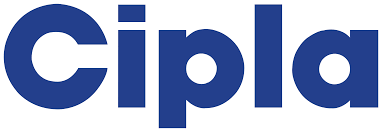
2. Healthcare companies like Pharma easy, Fortis Healthcare, etc.


3. Indian Armed force hospitals of Army, Navy, Air Force, etc.
4. AIIMS hospitals in Delhi, Jodhpur, Uttarakhand, Ranchi, etc. and other government and private hospitals.
5. AIIMS medical college in Delhi, Jodhpur, Uttarakhand, Ranchi, etc.
6. Railway Hospitals.
7. Drug regularities bodies.
Work Environment
Pharmacologists usually work in offices and laboratories. In the office, pharmacologists spend most of their time studying data and reports. In the laboratory, they work with different kinds of drugs including toxic drugs and work on different experiments. The work environment is generally safe. The medical advisor may also travel a lot. They might have to travel to hospitals and clinics.
Specialisation Tracks In This Career
1. Clinical Pharmacologist
Clinical Pharmacologists apply various pharmacological principles and insights in helping doctors and surgeons design the right clinical treatment using medicines (or what we call as prescriptions of medicines) to prevent, treat or cure human diseases, ailments and injuries. Clinical Pharmacologists ensure that for treatment of a patient, the right drugs (or medicines, as we call it) are used which are effective and have lesser or minimal side effects. They study the action of various kinds of drugs on the human body and decide upon the right amount of dosage (for a drug) which is not harmful.
2. Neuropharmacologist
A neuropharmacologist is a specialist who studies the effect of drugs on the nervous system. They also study the effect of drugs on human behaviour through neural mechanisms. As a Neuropharmacologist, you will study the two branches either behavioural or molecular. As a behavioural neuropharmacologist, you will study how drugs affect human behaviour (Neuropsychopharmacology). You will also study how an addiction to a drug may affect the human brain. As a molecular neuropharmacologist, you will study the neurons and neurochemical interactions. You will develop drugs that are beneficial to neurological functions. In either of these fields, you will study neurotransmitters, neuropeptides, neurohormones, neuromodulators, enzymes, second messengers, cotransporters, ion channels, and receptor proteins in the central and peripheral nervous systems. You will develop drugs that will treat many neurological disorders including pain, Alzheimer, Parkinson’s diseases, psychological disorders, addiction, neurodegenerative diseases, and many others.
3. Psychopharmacologist
Psychopharmacologists specialise in the study of the effects of drugs on the mood, sensation, thinking, and behaviour. As a Psychopharmacologist, you will study different kind of substances and their psychoactive properties including their chemical interactions with the brain. A psychoactive drug is a chemical that reacts with the nervous system and induces different psychological and physiological changes in the human body and brain. This specific interaction is called drug action, and the changes are called drug effect.
4. Cardiovascular Pharmacologist
A Cardiovascular Pharmacologist is a specialist who studies the effects of drugs on the cardiovascular system of the human body. The cardiovascular system includes the heart and blood vessels (arteries and veins).
5. Theoretical Pharmacologist (Computational Pharmacology)
Theoretical pharmacologists are the specialised researcher who studies techniques of computational chemistry, in particular, computational quantum chemistry and the method of molecular mechanics, are proving to be of great value. As a theoretical pharmacologist, you will try to establish the relation between the activity of a drug as observed from an experiment and its structural features as derived from a computer experiment. Thus, you will find the relationship between the structure and the activity. Thus you will research different biological activities of new drugs that are similar to existing drugs.
6. Environmental Pharmacologist
Environmental pharmacologist specializes in the study of the interaction of gene-environment, drug-environment, and toxin-environment. You will study the effect of healthcare, drugs, medicines, etc. on the environment, ecology, and aquatic ecosystems.
7. Experimental Pharmacologist
Experimental Pharmacologist specialises in testing the efficiency of medicines and drugs through bioassay methods. Bioassay is a method in which drugs are brought in contact with living cells and tissues, to test their potency.
8. Dental Pharmacologist
Dental Pharmacologists specialise in testing and studying drugs that are commonly used in dental treatments.
9. Toxicologist (Pharmacology)
Toxicologists specialise in understanding the effect of toxic molecules on the human body and preparing beneficial drugs out of these compounds.
10. Safety Pharmacologist
Safety Pharmacologists specialises in understanding and investigating any undesirable effect of drugs.
11. Pharmacologists (Pharmacogenomics)
Pharmacologists (Pharmacogenomics) specialise in understanding the role of drugs on the predefined population. Example of how a drug will affect the population of North Indians and how it will affect the population of south Indians as these people may have a different environment, diets, etc.
Career Growth
1. The career growth in university and college states from Assistant Professor and then Associate Professor, Professor and Professor Emeritus. Professors can also get administrative positions such as Director/Dean/Vice Chancellor, etc.
2. If you Join as a Medical Doctor, then you will go on to become Deputy Medical Superintendent and then Additional Medical Superintendent and then Medical Superintendent. You might also become director of the Hospital.
3. If you join Army hospitals, then you will move up as per the army ranks starting from Captain (and its equivalent in Navy and Air Force).
4. If you are hired as a research associate (JRF and SRF), then you will go on to become a Doctoral Research Fellow, then Post-Doctoral Research Fellow and then Scientist in Progressive grades.
5. If you join as a Medical Advisor, you will become a medical supervisor and then manager. You may end up becoming VP and also go into sales and marketing at the same time.
6. If you join as a pharma trainee, you will then become a clinical research associate, then health care scientist and then a senior scientist.
Salary Offered
After completing the M.D. course
1. At the entry level, one joins as a Consultant Physician and earn about Rs. 80,000 – 90,000 a month. With experience, their salary increases.
2. At the junior level with a work experience of 5-6 years, you would be earning anything between Rs. 1, 00,000 to 2, 00,000 per month.
3. At the middle level with an experience of 8-12 years, you would be earning anything between Rs. 1, 40,000 to 3, 00,000 per month.
4. At the senior level of over 12 years of work experience, you would be earning anything between Rs. 2, 40,000 to 6, 00,000 per month or even more.
After a Master degree in Pharmacology
1. At the entry level, you can join as a research associate with a basic salary of Rs. 25,000 to 30,000. As a doctoral research fellow (junior research fellow) you would be earning around Rs. 35,000 to 38,000 per month. At the entry level, as a Scientist (grade C) you would be earning around Rs. 80,000 to 100,000 per month. As an assistant professor, you would be earning anything between Rs. 65,000 to 70,000 per month.
2. At the junior level with a work experience of 2-6 years, you would be earning anything between Rs. 1, 20,000 to 1, 40,000 per month.
3. At the middle level with an experience of 10-12 years, you would be earning anything between Rs. 1, 40,000 to 1, 90,000 per month as a scientist and Rs. 1, 20,000 to 1, 60,000 as a professor.
4. At the senior level of over 15 years of work experience, you would be earning anything between Rs. 1,60,000 to 2,00,000 per month as a professor and Rs. 2,10,000 to 2,50,000 per month as a Scientist.
Monthly Earning In Indian Rupee
Entry Level | Junior Level | Mid-Level | Senior Level | |||||
Min Earning | Max Earning | Min Earning | Max Earning | Min Earning | Max Earning | Min Earning | Max Earning | |
20000 | 100000 | 40000 | 160000 | 70000 | 350000 | 100000 | 1000000 | |
1. Entry level: 0 - 2 years of work experience
2. Junior Level: From 1 to 12 years of work experience
3. Mid-Level: From 5 to 20+ years of work experience
4. Senior Level: From 10 to 25+ years of work experience (there could be exceptions in some high-end technical, financial, engineering, creative, management, sports, and other careers; also in the near future, people will reach these levels much faster in many careers and in some careers, these levels will have no meaning as those careers will be completely tech skill driven such as even now, there is almost no level in a Cyber Security Expert’s job)
Work Activities
1. Getting information & learning: Observing, hearing, reading, using computers, or otherwise obtaining information and learning from it.
2. Information processing: Searching, compiling, tabulating, calculating, auditing, verifying or otherwise dealing with information processing including data entry, transcription, recording, storing and maintaining databases.
3. Updating and using relevant knowledge: Keeping updated with the latest knowledge relevant to your fields of work and use of the relevant knowledge in getting things done.
Future Prospects
Indian Medical industry is growing exponentially riding on strong demand due to rising incomes, greater health awareness, and an increase in access to insurance. It might grow to 373 Billion USD in 2022 as per a report by ibef.org. Also, with the introduction of Ayushman Bharat, Insurance and the medical benefits given by the Government of India, more and more people will start using medical facilities. The hospital industry is expected to grow at 16-17% per year.
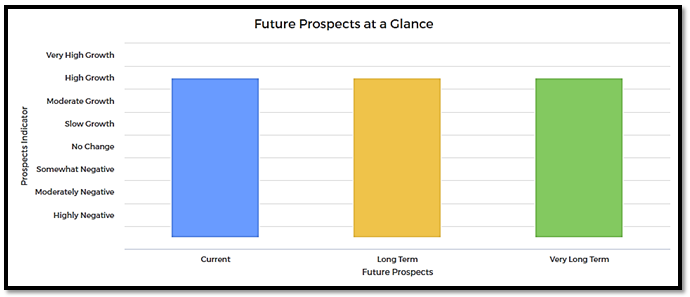
Future Prospects At A Glance
Current (0-1 year) | Long Term (2-5 year) | Very Long Term (6-10 years) |
High Growth | High Growth | High Growth |

